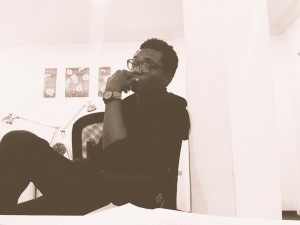“Lekwa uzor,” The Man barked, and the driver mumbled something polite while continuing to drive with his usual recklessness. A nameless rapper was shrieking painfully on the radio, drowning the hum of the car.
The Man was sweating, even though it was colder than a morgue in here. I hiked up my turtleneck and resisted the impulse to shudder.
That was the thing about The Man, I thought solemnly. He was ferocious, ruthless and cunning, three attributes I appreciated in the men I deferred. But over time, his own troops had come to undermine him. And it was all his fault, in my humble opinion. If you have to yell to get things done, someone once told me, you might as well make sure the slow-footed bastards are properly deaf.
I was not worried, however. Most of the people who did business with Us tended to fear The Man. Everyone who shook hands with him or clasped his cold wrists felt the same absence of pulse that announced that here stood a well-behaved psychopath, willing to play by the rules of this mundane setup for as long a time as it favored his personal agenda.
Keep your friends close, they whispered in the dark rooms of their meeting places, but keep your enemies closer. But keep The Man away, by all means.
At first it was easy: Lagos and Nigeria as a whole didn’t have much by way of crime, much less organized crime. I know what you are thinking: Nigeria is filled with crime! But that is not the kind I am talking about. I am referring to the kind of crime executed by gentlemen in smoky rooms while drinking expensive wines in small bottles, playing cards, and betting estates on them. The big crimes played by politicians paled into nothingness when these men stacked their chips against the Swiss-pumpers that allocated the country’s oil wells among themselves. We, in This Thing Of Ours, had no regard for these sort of crimes. They were interesting, yes, but yawningly unambitious. And so The Man often asked that I cut out the interesting bits off the daily papers so he never had to bore himself with the day-to-day news. More often than not, the interesting bits were the crosswords, the horoscope readings and the results from yesterday’s football game.
He would read his fortune every day, then chuckle, and say if horoscopes worked, it would be bloody inconvenient. Then he would do the crosswords, but not before setting his stopwatch. His personal best was three minutes fifteen seconds. Mine was one minute three seconds, but he did not know this.
Cruising through these treacherous Obalende roads to reconnect with the bearable roads that led into the over-celebrated edifices of the Lekki-Ikoyi suburbs, I finally got my cue to smoke: The Man wound down all windows. Thank God. I was dying for a cig.
He pulled out his precious little box of Cubans and watched me fumble with my bent Rothmans stubs. He laughed hoarsely and said something about cheap cigars and dying young. I didn’t ask him to save me by giving me a Cuban. It would have been disrespectful.
I wrote all The Man’s speeches ever since he saw to it that I wasn’t brutally murdered in Kirikiri prison. To this day, I am grateful to the guy we call Jack Sparrow, the wiry, silent accountant who ensured that there would never be a useful paper trail on The Man’s tail.
I should have been killed by friends of the bastard whose face I scraped off with a grater, but the call to the prison by The Man himself saved my life. The next minute I was standing in front of him, still wearing my smelly prison clothes.
“Thank you,” I remembered saying.
He ignored me and looked at Jack Sparrow. “You say he’s useful?”
“He can write.”
So I cruised with the man barely three months after he wrote me my first cheque and forced me to go pick up some nice clothes. For some reason, I had picked up way too many turtlenecks than a man could ever need. Something must have told me it was going to be cold here pretty soon.
The thing is, as soon as I started working for The Man, tongues started to wag. I was a nobody—I had no connections in the Gold Fence (a stupid title for the people who knew people who knew The Man, something like a 2nd degree connection on LinkedIn) to warrant what, to most of them I reckon, must have looked like eating at the high-table with The Man.
So employees had started to turn snitches, and the stories had gone abroad that The Man was losing his grip on This Thing Of Ours. Sometimes the blasphemy got to me; that The Man, the one who transplanted V’s philosophy onto the defiant West African soil, had lost his grip on the reins? Imbeciles.
Yet the bastards continued to reconnoitre. It was the little things: a military operation in the far north which The Man had politely asked the president to shut down (as it was inevitably inconveniencing his operations in a small town there) had kicked off again, and nobody could explain who had given the order. Yesterday, for the first time, The Man read the news—his contacts in Beirut called him to check it—and the reports there had been annoying. French delegates were coming to investigate a small matter which did not concern them.
The empire was not crumbling, but it looked like it was—and in This Thing Of Ours, appearances were everything.
We both needed to blow off some steam. Earlier in the day, I had written two speeches for two people—one for the vice President on his big speech in South Africa tomorrow and the other for the tiny governor of the state that was beginning to revolt due to his perceived administrative weakness. We continued to keep the polity fairly manageable because it was the vessel for everything else we did. We could not divorce our operations from it so we had to nurture it until such a time as it would—inevitably—have to die.
Our car came to a halt in front of a pink building. It looked washed in the overcompensating night lights, but I knew it was pink because I had slept in this building for the first few weeks after I was broken out of jail.
The Man continued to smoke, ignoring me. As it should be.
I stepped out, tapped the driver’s window and told him “five minutes.”
“Nothing past that, oga, you hear?” he said. I said nothing.
I let myself into the house through a window. I could be cat-footed when I wanted, and tonight suited my purpose. The room was dark, so I took care to walk only around the walls, letting the distance from my outstretched hand guide me in an obstacle-free course.
I felt for the light switch and turned it on.
Jack Sparrow was sitting, facing me unblinkingly, with a gun in his hand. This did not surprise me.
“I knew you would come,” he said, giving what he thought was a confident grin. It resembled a face post-puke.
“And you thought a gun was fortification enough?”
He regarded me thoughtfully.
“Yes,” he sighed.
I nodded, then walked a few steps sideways. His gun hand corrected its scope to accommodate its target. In those few seconds, I discovered a few more things about his gun proficiency than he realized.
“Did you think we wouldn’t find out eventually?” I asked conversationally.
“Of course not,” he said. “I knew you would. I was hoping you would.”
For the first time in twelve years, a paper trail had been found on The Man, and the EFCC was somersaulting with glee.
“All for what? The Man treats us well. For God’s sake, he treats you well!”
“No. He treats you well. Ever since you came…I never should have involved myself in your case. I should have let you die.”
“You disappoint me. This is, what, beef? Jealously? You feeling neglected by The Man?”
Jack attempted—and failed to produce—a smile again. “You slimy piece of shit. You were always a piece of shit, Turtleneck. There is no saving pieces of shit, I realize now.”
“What a coincidence. I had the exact thought.”
“What now?” he asked. “What are you going to do?”
“This,” I said, but before I could make a move, he fired his sidearm, and it ripped through my left shoulder. Shit.
He was yelling—“YOU BASTARD FOOLISH IDIOT MONKEY”— and all I wanted was for him to keep his bloody voice down. So I tossed the table encyclopedia at him. My aim was off, so it glanced off his elbow, but my deduction had been right: the gun was damn too heavy for his small hands, and he spun around more than he should have. I was running before he could recover, but I wasn’t fast enough—BLAM—he fired one more round into my lower abdomen, then I reached around his head and cleanly snapped his neck.
I lowered him gently onto the floor, searched around his room for my chaplet (I’d left it behind months ago) and beat it. Lights were already coming on in other apartments and I swear I could hear someone calling the police. Like that would help anyone.
I returned to the car. The driver wound down and started saying “it took more than five minutes…”—so I slammed his head against the car steering. Turns out it was a bit too forceful, the slamming, and he died on impact. I pushed him aside and took over the wheel.
We were going back to the mainland, and this time I was driving a lot more carefully, and at the back I heard The Man settle into a relaxed snore. It was almost midnight.
Killing Jack Sparrow wasn’t going to fix anything. It had just been something The Man and I agreed that we would enjoy doing. The speeches I would write tomorrow—and the calls The Man would make— now those would fix everything.
Because in This Thing Of Ours, appearances were everything and everyone needed to know that nobody messed with The Man. Not even those presumed to be family, like Jack Sparrow was.
An OAP with a nasal accent was speaking, and her frightening laughter jarred The Man awake.
“Turtleneck,” he yawned. “You had only one target tonight. Why did you do the driver?”
“He should have listened harder to your driving admonitions,” I said, eyes on the road, as I navigated a treacherous bend.
He said nothing, which was as good as acquiescence.
I was bleeding onto the plush seats of the N950million car, but somehow I suspected The Man wouldn’t mind. I was also feeling light-headed.
The OAP laughed again.
*********
Post image by Rookuzz via Flickr
About the Author:
 Justin Irabor is a mostly-amused, sometimes-bewildered writer who writes as something to do while he waits to grow a beard. He drinks way too much chocolate milk for his own good and cannot be found sitting in one place for too long. He hopes to win an award for something, anything, and retire from his active life of crime fiction to a nondescript beach on a very descript island. He blogs on thevunderkind.com. He tweets at @thevunderkind.
Justin Irabor is a mostly-amused, sometimes-bewildered writer who writes as something to do while he waits to grow a beard. He drinks way too much chocolate milk for his own good and cannot be found sitting in one place for too long. He hopes to win an award for something, anything, and retire from his active life of crime fiction to a nondescript beach on a very descript island. He blogs on thevunderkind.com. He tweets at @thevunderkind.










Kesed March 11, 2016 11:40
Nyc writeup dear :)